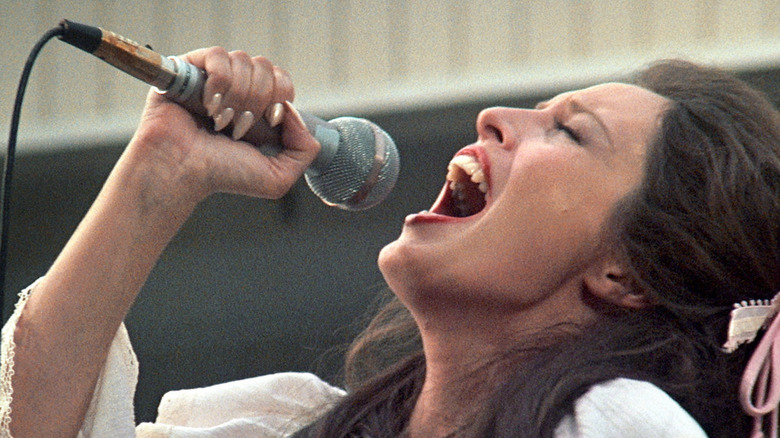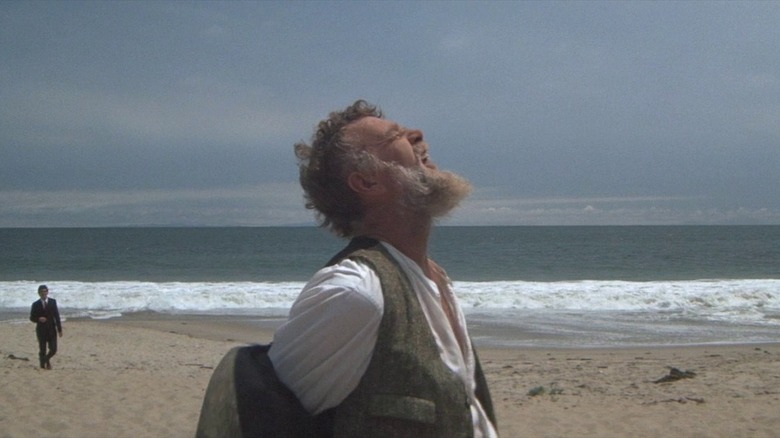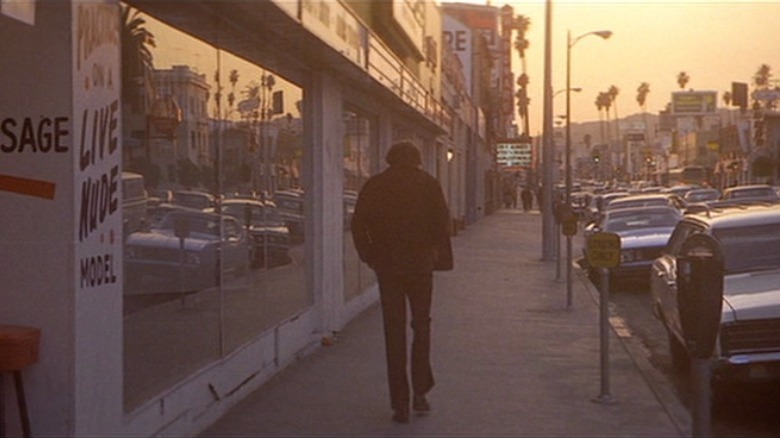Robert Altman Had An Interesting Theory On How Audiences Experience Films
If you've ever had the delight of watching one of Robert Altman's films, you know just how good the director is at creating an immersive world, one that gently holds the viewer's hand as it whisks them along for a ride. Sure, the same could technically be said about any movie, or even any show — to some degree, you'll always need to suspend your disbelief when watching a fictional work — but there's just something different about Altman's work.
Take "The Long Goodbye" — although the movie is personally my favorite Altman (and possibly my favorite movie), it has too many ineffable qualities for a description to do it justice. Sure, it's fun to watch Elliot Gould wander around and mutter to himself (bonus points if you're counting how many times he lights a cigarette — just don't turn it into a drinking game for your own sake), but the movie's real charm is its hazy, dreamlike quality. Try as he might to become an agent of change in his own life, Detective Philip Marlowe (Gould) is just drifting through his world, taking us along for a sightseeing tour in the process. And while Altman worked on a pretty diverse list of projects, many of his most successful films have the same effect. The director's signature ensemble casts, overlapping dialogue, and tendency to drift between subjects make it easy to truly get lost in a new world.
Building a sandcastle
Perhaps it's no surprise that a director renowned for creating unusually dynamic, lifelike settings would have an unconventional theory about how both film crews and the audience experience movies. In 2001, Altman used a quaint metaphor to explain his thoughts to the British Filmmaking Institution:
It's really like building a sandcastle ... It's the doing the work that is the art and that is the reason for the art and that is the fun of it. You get your friends together and you build a sandcastle and the tide comes in, and twenty minutes later the sand is all smooth everything has gone. That castle remains only in the memories of the people who did it, really, not so much the people who saw it ... You'll always say, 'Man, there was that day in November when we did that. That was the greatest one, wasn't that the good one?' And that's the way these films are, as we remember it ... They age better in your memory."
Of course, I'm sure that a film's crew would remember the movie they worked on better than the audience, but I would have to disagree with the idea that the castle doesn't really live on in the memories of the audience. Don't get me wrong, I'm not claiming to remember every single movie I've ever seen. But when you've got a film that does a great job of replicating reality, you almost get a similar effect to traveling somewhere new. You're still trying to get your bearings in this unfamiliar land so there's plenty that goes over your head. Yet nevertheless, you're in an exciting state of discovery. You might not remember the castle's finer details, but if it was impressive, you'll certainly remember its contours.
A medium still unexplored
Try as he might to create beautiful sandcastles, Altman remained humble — and critical of current movies, including his own. On multiple occasions, the director shared a pretty harsh-sounding opinion: that existing films had not yet properly tried to be films, leaving the possibilities of the medium unexplored. It's a pretty confusing idea that's probably best explained in Altman's own words, courtesy of an insightful 1972 interview with Dick Cavett:
"I feel that the medium of film has not yet really been explored. In other words, I think that when we started film, we took it from theatre and literature, and we were an extension of another art form. It's still that way. It's getting away from it, and I think that eventually somebody will make a film that is purely a film and the audience can respond to it as such, [but] I don't think it's been done."
While it might be difficult to imagine a film that's totally divorced from literature or theatre, Altman went on to share that his ideal film was similar to "a painting" and "an experience." Though he acknowledged that a film would face temporal constraints that paintings could avoid, his ideal situation was one in which "the audience can look at a film emotionally, get the whole thing, and not necessarily be able to explain it to somebody else." It's hard to imagine just what this ideal film might be (would it feature images melting into each other, "Paprika"-style? Is the existence of a plot tied too closely to literature and theatre?), but it's certainly interesting to watch some of Altman's slice of life movies knowing that the director placed such high value on the viewer's "experience."


